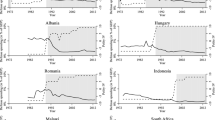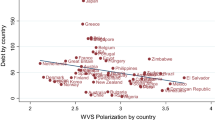Conclusions
As we explained there is really little a priori reasoning for a clear prediction that authoritarian regimes will incur more foreign debt. In fact, some other empirical literature reveals that such regimes will face a higher supply price for such debt. Anderson presents a study of a single year using an admittedly crude measure of authoritarianism that finds that such regimes do issue more debt.
This study provides a fuller examination of the empirical relationship between foreign debt and the nature of the polity's regime. Utilizing a continuous democracy variable and a continuous political liberty variable, it tests the relationship between debt and political variables. It finds little empirical support for the thesis that democracy or autocracy influence foreign debt levels. Generally the continuous variables are not significant if we use a linear in the logs specification. While a linear specification obtains results more consistent with the idea that level of democracy decreases debt, it also obtains results even less favorable to the idea that extreme forms of autocracy increase debt.
The formal theorizing about public choices in different types of political regimes has only just begun. It is really unclear how the level of democracy affects choices of various fiscal variables. It is certainly unclear how it affects debt levels. This paper helps make that lack of clarity a little more evident.
Similar content being viewed by others
References
Anderson, G. (1988). Public finance in autocratic process: An empirical note. Public Choice 57: 25–37.
Arat, Z. (1984). Viability of political democracy in developing countries. Unpublished doctoral dissertation. SUNY-Binghamton.
Balkan, E.M. (1988). Country risk, probability of default and optimal lending. Unpublished doctoral disseration. SUNY-Binghamton.
Banks, A.S. (1986). Cross national time series data archive. Data tape and User's Manual at Center for Social Analysis, Binghamton.
Block, P. (1986). The politico-economic behavior of authoritarian governments. Public Choice 51: 117–128.
Euromoney (1988). The Euromoney country risk ratings. (September): 232–233.
Gastil, R. (1984). Freedom in the world: Political rights and civil liberties. New York: Freedom House.
International Monetary Fund. Government finance statistics, 1971–1988 (on data tape, ICPSR Number 8624).
International Monetary Fund. International financial statistics, 1948–1988 (on data tape, ICPSR Number 7629).
Institutional Investor (1988). Country credit ratings (Table) 22: 225–226.
Lott, J.R. (1987). The institutional arrangement of public education: The puzzle of exclusive territories. Public Choice 54: 89–96.
Paxton, J. (Ed.) (1985). The statesman's yearbook, 1985–86. New York: St. Martin's Press.
Scully, G.W. (1988). The institutional framework and economic development. Journal of Political Economy 96 (3): 652–662.
Soltan, K. (1988). Democracy, dictatorship and decision costs. Public Choice 57: 157–173.
Tullock, G. (1986). Autocracy. Boston: Martinus Nijhoff.
Usher, D. and Engineer, M. (1987). The distribution of income in a despotic society. Public Choice 54: 261–276.
World Bank, World debt tables 1971–1986 (on data tape, ICPSR Number 8313).
Author information
Authors and Affiliations
Rights and permissions
About this article
Cite this article
Balkan, E.M., Greene, K.V. On democracy and debt. Public Choice 67, 201–211 (1990). https://doi.org/10.1007/BF00224681
Received:
Accepted:
Issue Date:
DOI: https://doi.org/10.1007/BF00224681




